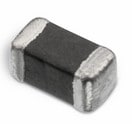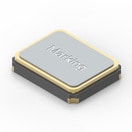Details
| Topologie | FPGA |
| IC-Revision | A |
Beschreibung
The LPC55S6x MCU family is part of the EdgeVerse™ edge computing platform and builds on the world’s first general-purpose Cortex-M33 based microcontroller introduced with the LPC5500 series. This high-efficiency family, inclusive of LPC55S69JBD100, LPC55S66JBD100, LPC55S69JEV98, LPCS66JEV98, LPC55S69JBD64, LPCS66JBD64 MCUs, leverages the new Armv8-M architecture to introduce new levels of performance and advanced security capabilities including TrustZone-M and co-processor extensions. The LPC55S6x family enables these co-processors extensions and leverages them to bring significant signal processing efficiency gains from a proprietary DSP accelerator offering a 10x clock cycle reduction. An optional second Cortex-M33 core offers flexibility to balance high performance and power efficiency.In addition, the LPC55S6x MCU family provides benefits from 40nm NVM based process technology cost advantages, broad scalable packages, and memory options, as well as a robust enablement including MCUXpresso Software and Tools ecosystem and low-cost development boards.
Eigenschaften
- Arm Cortex-M33 processor, running at a frequency of up to 150 MHz
- TrustZone, floating point unit (FPU) and memory protection unit (MPU)
- Arm Cortex-M33 built-in nested vectored interrupt controller (NVIC)
- Non-maskable interrupt (NMI) input with a selection of sources
Typische Anwendungen
- Smart Lock, Home Security and Surveillance, Home Control and Security, Smart Appliance
- Brushless DC Motor (BLDC) Control, Motor Drives, Factory Automation, Building Control, Electricity Meter, Industrial HMI, Permanent Magnet Synchronous Motor (PMSM)
Weiterführende Informationen
Artikeldaten
| Artikel Nr. | Datenblatt | Simulation | Downloads | Status | Produktserie | λDom typ. (nm) | Farbe | λPeak typ. (nm) | IV typ. (mcd) | VF typ. (V) | Chiptechnologie | 2θ50% typ. (°) | Anwendung | f | Tol. f | Stabilität (ppm) | Cload (pF) | Betriebstemperatur | C | Tol. C | VR (V (DC)) | Bauform | DF (%) | RISO | Keramiktyp | L (mm) | W (mm) | H (mm) | Fl (mm) | Verpackung | Z @ 100 MHz (Ω) | Zmax (Ω) | Testbedingung Zmax | IR 2 (mA) | RDC max. (Ω) | Typ | Muster | |
|---|---|---|---|---|---|---|---|---|---|---|---|---|---|---|---|---|---|---|---|---|---|---|---|---|---|---|---|---|---|---|---|---|---|---|---|---|---|---|
 | 150040SS73240 | SPEC | 7 Dateien | Aktiv i| Produktion ist aktiv. Erwartete Lebenszeit: >10 Jahre. | WL-SMCC SMT Mono-color Chip LED Compact | 630 | Superrot | 645 | 75 | 2 | AlInGaP | 120 | – | – | – | – | – | -40 °C up to +85 °C | – | – | – | 0402 | – | – | – | – | – | – | – | – | – | – | – | – | – | – | ||
 | 742792651 | SPEC | 9 Dateien | Aktiv i| Produktion ist aktiv. Erwartete Lebenszeit: >10 Jahre. | WE-CBF SMT-Ferrit | – | – | – | – | – | – | – | – | – | – | – | – | -55 °C up to +125 °C | – | – | – | 0603 | – | – | – | 1.6 | 0.8 | 0.8 | 0.3 | – | 600 | 800 | 200 MHz | 1000 | 0.2 | Hochstrom | ||
| 885012205037 | SPEC | 7 Dateien | Aktiv i| Produktion ist aktiv. Erwartete Lebenszeit: >10 Jahre. | WCAP-CSGP MLCCs 16 V(DC) | – | – | – | – | – | – | – | – | – | – | – | – | -55 °C up to +125 °C | 100 nF | ±10% | 16 | 0402 | 5 | 5 GΩ | X7R Klasse II | 1 | 0.5 | 0.5 | 0.25 | 7" Tape & Reel | – | – | – | – | – | – | |||
| 885012106017 | SPEC | 9 Dateien | Aktiv i| Produktion ist aktiv. Erwartete Lebenszeit: >10 Jahre. | WCAP-CSGP MLCCs 16 V(DC) | – | – | – | – | – | – | – | – | – | – | – | – | -55 °C up to +85 °C | 1 µF | ±20% | 16 | 0603 | 10 | 0.1 GΩ | X5R Klasse II | 1.6 | 0.8 | 0.8 | 0.4 | 7" Tape & Reel | – | – | – | – | – | – | |||
 | 830064296 | SPEC | 6 Dateien | Aktiv i| Produktion ist aktiv. Erwartete Lebenszeit: >10 Jahre. | WE-XTAL Schwingquarz | – | – | – | – | – | – | – | Processor, CAN, Bluetooth | 16 MHz | ±20ppm | 20 | 8 | -10 °C up to +70 °C | – | – | – | CFPX-180 | – | – | – | 3.2 | 2.5 | 0.8 | – | – | – | – | – | – | – | – |
| Artikel Nr. | Datenblatt | Simulation | |
|---|---|---|---|
 | 150040SS73240 | SPEC | |
 | 742792651 | SPEC | |
| 885012205037 | SPEC | ||
| 885012106017 | SPEC | ||
 | 830064296 | SPEC |
| Muster |
|---|
| Artikel Nr. | Datenblatt | Simulation | Downloads | Status | Produktserie | λDom typ. (nm) | Farbe | λPeak typ. (nm) | IV typ. (mcd) | VF typ. (V) | Chiptechnologie | 2θ50% typ. (°) | Anwendung | f | Tol. f | Stabilität (ppm) | Cload (pF) | Betriebstemperatur | C | Tol. C | VR (V (DC)) | Bauform | DF (%) | RISO | Keramiktyp | L (mm) | W (mm) | H (mm) | Fl (mm) | Verpackung | Z @ 100 MHz (Ω) | Zmax (Ω) | Testbedingung Zmax | IR 2 (mA) | RDC max. (Ω) | Typ | Muster |
|---|






